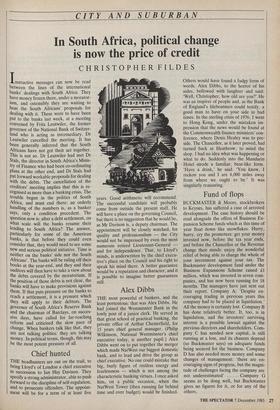CITY AND SUBURBAN
In South Africa, political change is now the price of credit
CHRISTOPHER FILDES
Instructive messages can now be read between the lines of the international banks' dealings with South Africa. They have money frozen there, under a morator- ium, and ostensibly they are waiting to hear the South Africans' proposals for dealing with it. These were to have been put to the banks last week, at a meeting convened by Fritz Leutwiler, the former governor of the National Bank of Switzer- land who is acting as intermediary. Dr Leutwiler cancelled the meeting. It has been generally inferred that the South Africans have not got their act together. This is not so. Dr Leutwiler had met Dr Stals, the director in South Africa's Minis- try of Finance who had been co-ordinating plans at the other end, and Dr Stals had put forward workable proposals for dealing with the debts. The cancellation of the creditors' meeting implies that this is re- cognised as more than a banking crisis. The trouble began in the politics of South Africa, and must end there: an orderly handling of the numbers is, as a banker says, only a condition precedent. The question now is: after a debt settlement, on what scale will the banks resume their lending to South Africa? The answer, Particularly for some of the American banks, is that before they could even consider that, they would need to see some new and serious political initiative. Time is neither on the banks' side nor the South Africans'. The banks will be ruling off their books at the year-end, and they and their auditors will then have to take a view about the debts covered by the moratorium. If the position of those debts is not clear, the banks will have to make provisions against them. If that puts pressure on the banks to reach a settlement, it is a pressure which they will apply to their debtors. The governor of South Africa's Reserve Bank and the chairman of Barclays, on succes- sive days, have called for far-reaching reform and criticised the slow pace of change. When bankers talk like that, they are not talking politics: they are talking money. In political terms, though, this may be the most potent pressure of all.


































































 Previous page
Previous page